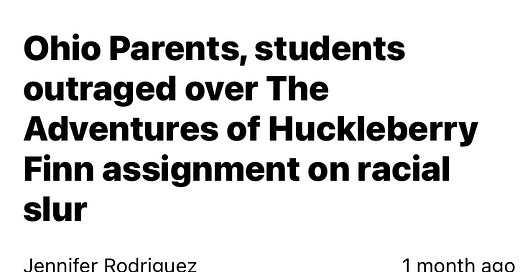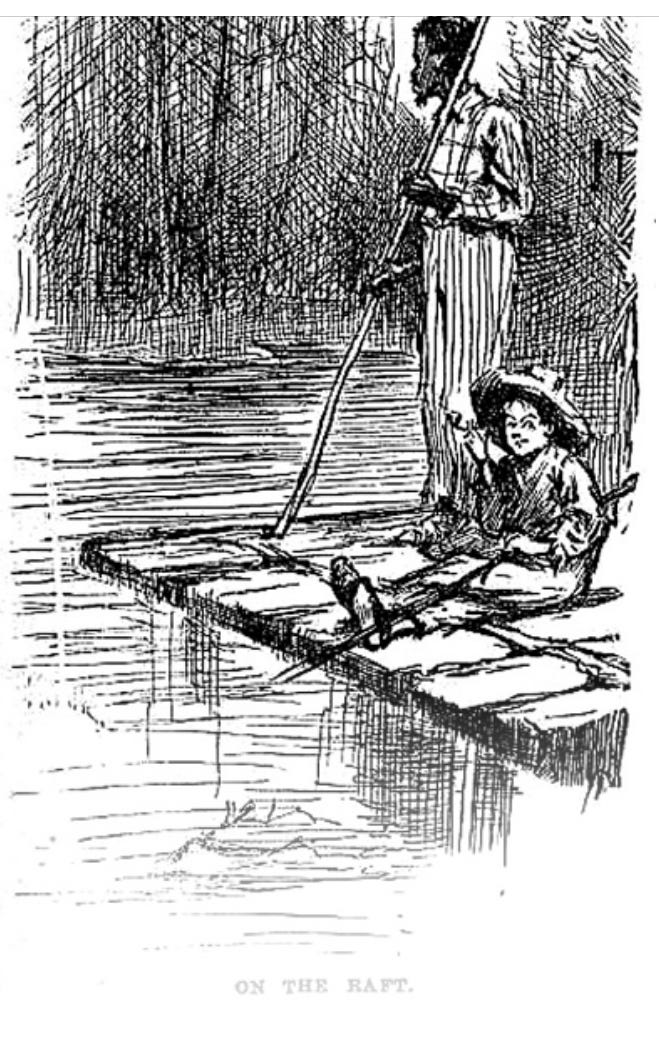I’ve found that learning to read literature in an academic setting can be absorbing, playful, addictive—life-changing. What appears at first glance to be drudgery can in a participatory setting turn out to be inspiring. Take a book like The Adventures of Huckleberry Finn. The cool thing about this book is it comes with a ton of baggage. It may be the most revered and reviled work of American literature.
READ CHAPTER 15-16 BY THURSDAY. INTERPRET THE RAFT AS A SYMBOL OF HOPE FOR AMERICA. BE READY TO CITE EVIDENCE FROM THE TEXT.
***
It’s risky business to invite this book into a classroom. Some districts are reported to be discouraging teachers who have not been trained in moderating discussions involving racism from teaching it. Others are flat banning it. In the current zeitgeist teachers with state-of-the-art training could be forgiven for harboring some ambivalence. Witness:
Ohio isn’t the only state with a Huck problem.1 And the Huck problem is just one of hundreds of serious censorship problems facing teachers. Ironically, the intensity of discomfort conservative members of society are feeling about their children reading culturally and socially relevant literature underscores the promise of literature to humanize sensibilities. It doesn’t get much more American than Jim and Huck on a raft.
***
Huck, presumed dead by the townsfolk, presumably dumped with his throat slit in the Mississippi River in 1828 or thereabouts, and Jim, a slave escaped from Miss Watson, his owner, a cashed strapped white lady intent on putting him up for auction in New Orleans, cooked up a plan using a raft to escape from the prison of the South to free territory.
All of this was imagined by Mark Twain, an author in need of transportation for his plot, something apt for a piece of young white trash and a fugitive slave to travel beyond the reach of the slave system. A raft with some sort of shelter…a wigwam on the raft, yes, American Indians on this raft, rafting from subjugation to freedom…
***
Who knew that Huck and Jim would become mythic figures in 11th grade English classrooms a century or so later—even though the book has been forbidden fruit in schools year after year, decade after decade?
Does anybody have ideas about why a book so squarely about a central fact of American life has been so contentious a part of the American curriculum?
Where else could this story have happened if not in America, if not on a raft on the Mississippi River, one shore in Missouri, a slave state, an obscene compromise in its admissions history, the other in Illinois, a free state, the promise of the boy Abraham Lincoln growing into adulthood, as the raft moved with the current?
Where else could there have been a modern country half slave, medieval and brutal, half free, enlightened and dedicated to equality, with a schizophrenic flaw permeating its Constitution hurtling its people toward a Civil War?
Where else was the consequence human greed, hard-heartedness, and folly so resplendently, painfully displayed for the taking than in the 1830s on this raft made of bitter irony and the possibility of redemption through humor?
What better symbol for the fragility of democracy than a raft with a wigwam for shelter on a wide river carrying a white child and a black slave to freedom?
***
In 1885 when Twain published his book, white policeman and sheriffs had replaced slave catchers, legal contract labor had replaced legal slavery for doing hard labor under threat of the whip, the Ku Klux Klan was night riding and burning crosses, Frederick Douglass was dying but still trying, the Supreme doctrine of separate but equal would become real in a decade. There was reason for pessimism. It was a good time to spin a tale about a young white child marinated in ignorance and white supremacy who overcomes his consciousness of guilt for helping a fugitive slave escape to freedom.
It was an awkward moment, but Huck pledges to Jim that the white child will not betray the black man:
Twain’s readers would have known about the hellish slave trade in New Orleans from Harriet Beecher Stowe’s widely read Uncle Tom’s Cabin published in 1854. Historians have argued that Uncle Tom and his story, a work of literature unflinching in its depiction of the cruelty and violence of slavery, was a salient factor in the coming of the terrible swift sword of war.
***
Like Jonathan Swift’s A Modest Proposal, which is a tongue in cheek suggestion that the British send their excess children to the slaughter for food during a famine, Twain’s book had a turbulent reception which foretold a rocky ride on a rough hewn raft into the canon of American literature. The situation in the years after the Civil War was as it still is today, a stubborn white supremacy clinging to Christian capitalism. Miss Watson needed the money.
***
Anthropologists studying humor have discovered that laughing—and crying—are universal behaviors. But people learn to laugh or cry for different reasons in different spaces.2 Laughter in particular has survival value and so is hard-wired into our flesh. “A joke is an epitaph on the death of a feeling,” wrote Nietzsche.
Mark Twain’s joke—using Huck’s guilty conscience as poignant evidence of the slave power’s depravity—might have worked for some of his audience by playing upon his readers’ naive belief that sentiments of white supremacy had perished with the incorporation of the 13th, 14th, and 15th Amendments into the Constitution.
Feelings of white supremacy were dead, some must have thought; it would be all right to laugh as even an uneducated, racist child realizes on his own what the oligarchs of the South failed to learn about the human heart: Human beings are made to live free. It might even feel good to imagine Huck as a symbol of the Southern failure to thrive as a slave power, brought down by its children who even in the direst of straits understand freedom as an ethical imperative.
But for the joke to work, Twain needed to establish Huck’s full indoctrination into white supremacy. It wasn’t easy for Huck to resist his upbringing. He felt guilty. Early in the novel as Huck and Jim make their way toward Cairo, Illinois, the gateway to freedom, the pair find themselves lost geographically, worried that they might make a mistake and end up going ashore in the wrong town and wind up in trouble.
Jim expresses the depths of his gratitude to Huck for helping him escape the auction block as they float toward the lights of a town in the offing that just might be Cairo. After a particularly heartfelt burst of gratitude from Jim, Huck is granted an interior monologue by his author expressing his miserable ambivalence about turning against white power. The following oral reading of this interior monologue, like the earlier clip of Jim speaking, was rendered by Mark Smith of South Carolina and is in the public domain:
***
Whether we think Huck is laughable at this moment depends on how we view him. In 1885 white supremacy was under control, outlawed Constitutionally, and readers likely saw this childish behavior as humorous. Language whether stylized in a riddle or a pun or simply ad libbed in the moment can evoke laughter, but laughter predates language. People laugh in their dreams.3 In some ways, literary texts evoke a dream state with an imaginative, thematic, or narrative core. Is it defensible to assume that humor, this vital response that can clarify or terrify us in real or imaginary time-spaces, can be apprehended if readers approach a piece of literature as a text with four corners?
What does it mean that Twain’s novel is set in the 1830s while his contemporary audience lived in the 1880s? What does it mean that that parents in Ohio in 2023 want the book out of the classroom? What is the significance of the raft Jim and Huck ride upon to try to escape a history that is now being in some quarters denied? Of what use is literature?
https://www.wtrf.com/ohio/ohio-parents-students-outraged-over-the-adventures-of-huckleberry-finn-assignment-on-racial-slur/amp/
https://www.npr.org/sections/health-shots/2012/08/06/157592468/an-anthropologist-walks-into-a-bar-and-asks-why-is-this-joke-funny/
https://d31kydh6n6r5j5.cloudfront.net/uploads/sites/45/2019/10/SOAN222-S19-Anthro-of-Humor-Jay-Levi.pdf




